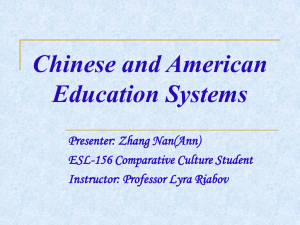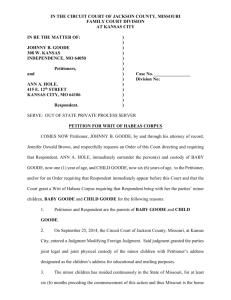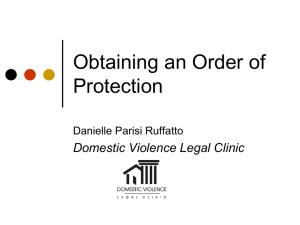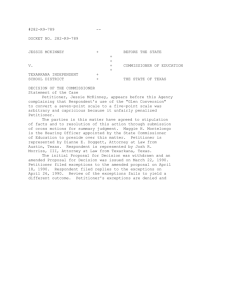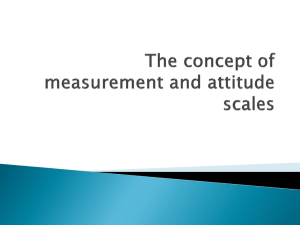#051-R9-1085 -- DOCKET NO. 051-R9
advertisement
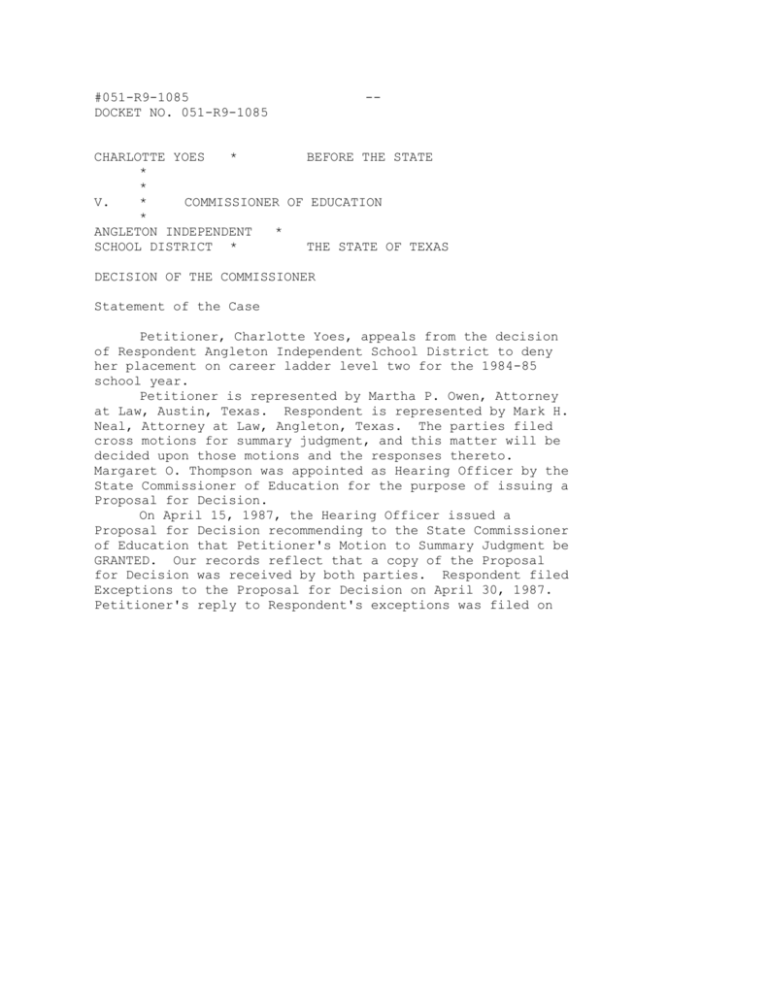
#051-R9-1085 DOCKET NO. 051-R9-1085 -- CHARLOTTE YOES * BEFORE THE STATE * * V. * COMMISSIONER OF EDUCATION * ANGLETON INDEPENDENT * SCHOOL DISTRICT * THE STATE OF TEXAS DECISION OF THE COMMISSIONER Statement of the Case Petitioner, Charlotte Yoes, appeals from the decision of Respondent Angleton Independent School District to deny her placement on career ladder level two for the 1984-85 school year. Petitioner is represented by Martha P. Owen, Attorney at Law, Austin, Texas. Respondent is represented by Mark H. Neal, Attorney at Law, Angleton, Texas. The parties filed cross motions for summary judgment, and this matter will be decided upon those motions and the responses thereto. Margaret O. Thompson was appointed as Hearing Officer by the State Commissioner of Education for the purpose of issuing a Proposal for Decision. On April 15, 1987, the Hearing Officer issued a Proposal for Decision recommending to the State Commissioner of Education that Petitioner's Motion to Summary Judgment be GRANTED. Our records reflect that a copy of the Proposal for Decision was received by both parties. Respondent filed Exceptions to the Proposal for Decision on April 30, 1987. Petitioner's reply to Respondent's exceptions was filed on May 26, 1987. Findings of Fact After due consideration of the evidence and matters officially noticed, in my capacity as State Commissioner of Education, I make the following Findings of Fact: 1. Petitioner, a teacher in Respondent school district, applied for career ladder level two placement for the 1984-85 school year. (Pet. Rev., par. 5). 2. Petitioner held a bachelor's degree, and presented 15 hours of higher education course credits in her application for level two placement. (Pet. M. Sum. J., Ex. E). 3. In August, 1984 teachers with bachelor's degrees in Respondent district received a letter from the superintendent which stated as follows: Dear Teacher: New state law provides for a teacher career ladder. Teachers will be on level I or level II during 1984-85. You hold a bachelor's degree and may be eligible for level II during 1984-85. Temporarily, you have been placed on level I, and the attached contract reflects this. A committee of five will accept applications from holders of bachelors degrees who feel sure that they belong on level II. If the committee determines that you meet all qualifications, the level II supplement will be added to your 1984-85 salary. Qualifications are: For the 1984-85 school year, a classroom teacher must have a B.A. or B.S. degree, three years of teaching experience with at least acceptable past performance, a permanent teaching certificate, and nine or more semester hours of higher education course work in the general area of teaching assignment, pedagogy, or classroom management. All of the above must have been obtained prior to September 1, 1984. The only acceptable proof of the above is an official sealed transcript from an accredited college or university, and an official school service record. An application form is enclosed. The application form must be completed and turned in to Mr. Gus Nelson's office not later than September 15, 1984. The official transcript including the hours in higher education must be in Mrs. Flo Kubala's office not later than September 15, 1984, if you wish to be considered. Sincerely, /s/ Easton Wall Superintendent (Pet. Mot. Sum. J., Ex. B). 4. At the same time, teachers with master's degrees were informed by the Superintendent as follows: Dear Teacher: New State law provides for career ladder levels for classroom teachers. Teachers may be placed on levels I or II for 1984-85. The law states that classroom teachers with a master's degree in the subject taught, and two or more years acceptable past experience, as of September 1, 1984, may be placed on level II. Also, classroom teachers with bachelor's degrees, three or more years experience, and nine or more graduate hours in the subject taught may be placed on level II. We are placing you on level II for 1984-85, based on your having a master's degree. A committee of five will be evaluating your formal training reflected on your official transcript. If you meet either of the above requirements, you will remain on level II for 1985-86. If you do not meet either of the above requirements by September 1, 1985, the law requires us to move you back to level I for 1985-86. You will be notified soon after October 1, 1984, if it appears that you do not meet either of the sets of requirements. This will give you time to work off any deficiencies if you wish to do so. We will appreciate your working with us on this. Sincerely, /s/ Easton Wall Superintendent (Pet. Mot. Sum. J., Ex. C). 5. The statute in effect at all times relevant to this matter regarding qualifications for level two placement states as follows: To enter level two, a teacher must have at least performance exceeding expectations during the preceding year and satisfactory performance the other year(s), hold a level two certificate, and must have: (1) a B.A. or B.S. degree, three years of teaching experience, and nine semester hours of higher education course work or 135 hours of advanced academic training or an equivalent combination so that one semester hour of higher education course work is equivalent to 15 hours of advanced academic training; or (2) An M.A. or M.S. degree in the subject taught and two years of teaching experience. (Tex. Ed. Code Section 13.308, Vernon Supp. 1986). 6. The statute in effect regarding higher education course work states as follows: (a) Higher education course work and advanced academic training must relate to the general subject area taught and must be accredited by the board. (b) The board shall include classroom management training among the advanced academic training it accredits and shall specify the amount of classroom management training required at each level. (Tex. Educ. Code Section 13.315 (Vernon Supp. 1986). 7. In April, 1985 the Board of Trustees of Respondent school district adopted a career ladder policy for 1984-85 placement which was based in part on Texas State Board of Education rules adopted in March, 1985. The State Board rules were intended to be effective for the 1985-86 career ladder placement year. For teachers with bachelor's degrees the local board policy contained the following requirements regarding education and experience: Option I 1. A baccalaureate degree 2. Three years of classroom teaching experience 3. An employee must have been employed by the Angleton ISD during the 1983-84 school year to qualify for placement on Level II of the Career Ladder in 1984-85, and 4. Nine semester hours of higher education course work. At least 50% of course work must be taken in the subject or in a methods course related to the subject taught and/or certified as listed in Chapter 75. (The State and Federal Constitution course needed for certification of out of state teachers will not qualify for Career Ladder placement.) (Local Record, Ex. 6). 8. For teachers with master's degrees, the Board adopted two options in their policy. One was not based on the State Board rules. It stated as follows: Option II All Career Ladder decisions made prior to March 15, 1985 of the placement of teachers with master's degrees and two years or more of experience on Level II. (Local Record, Ex. 6). An alternative version of Option II is found in a document headed: At the April 12, 1985 meeting of the Angleton Board of Education the following guidelines were approved for placement of teachers on the Career Ladder for 1984-85 school year. It stated as follows: Option II The Committee endorses all Career Ladder decisions made prior to March 15, 1984 (sic) of teachers with master's degrees and two years of experience on Level II. (Pet. M. Sum. J., Ex. F). Option III, based on the State Board rules, provided as follows: Option III 1. A master's degree in: a. a subject listed in Chapter 75 as an elementary, secondary, or all-level subject to be taught b. education (excluding degrees specifically designed for preparation for special service positions such as administrator, counselor, supervisor, etc.) with a concentration of at least twelve semester hours in a subject or combination of subjects to be taught in the public schools, or c. an endorsement area or delivery system approved by the State Board of Education such as kindergarten or other endorsements and bilingual and special education delivery systems, and 2. Two years of classroom teaching experience. (Local Record, Ex. 6). 9. Applying Option II, Respondent placed all teachers with master's degrees on level two for 1984-85 regardless of the subject area of their master's course work. (Pet. for Rev., Pars. 8, 14). 10. Respondent's career ladder committee denied Petitioner placement on level two, stating to her in writing that the reason for the denial was that Petitioner had "insufficient course work in subject area." (Pet. Mot. Sum. J., Ex. G). 11. Petitioner appealed her denial of placement to the Board of Trustees; her appeal was denied. (Pet. for Rev., par. 6). Discussion Petitioner raises three issues in appealing her denial of placement on career ladder level two for the 1984-85 school year: (1) Was the requirement that at least 50% of the required higher education course work be in the subject taught or in a methods course related to the subject taught and/or certified as listed in Chapter 75 arbitrary and capricious? (2) Was the automatic placement of teachers with master's degrees arbitrary and capricious? (3) Alternatively, Petitioner asks the hearing officer to determine if the courses offered by Respondent meet the 50% requirement. The courses which Petitioner, a sixth grade reading teacher, offered in order to meet the required nine hours of higher education credit beyond the bachelor's degree were in the areas of reading, classroom management and teaching methods. (Pet. Mot. Sum. J., Ex. A, Ex. D). These courses appear to meet the statutory requirement that higher education course work "must relate to the general subject area taught." However, the career ladder committee rejected Petitioner's application because the courses did not meet the district's stricter requirement of being at least 50% in the subject taught. By contrast, all teachers in the district holding master's degrees and the required experience were placed on level two regardless of the subject matter of the courses taken for the master's degree, and despite the statutory requirement that master's degrees must be "in the subject taught." (Tex. Ed. Code Section 13.308(2), Vernon Supp. 1986.) Respondent Board of Trustees was entitled to adopt stricter requirements for level two placement than were required by the guidelines issued by the State Board of Education in July, 1984. See Bice v. Andrews ISD, Docket No. 009-R9-985, Dec. Comm'r, February, 1987. Those guidelines are stated as "Minimum Requirements for Assignments to Level Two for 1984-85" (emphasis added) (Implementation of H.B. 72, Explanations and Interpretations, July 1984, TEA). The Board, however, is obligated to observe statutory requirements and to adopt a policy which is reasonable in its application to all teachers. Respondent adopted a policy which required bachelor's degreed teachers to meet a stricter standard regarding higher education course work than it required of master's degreed teachers. There is no rational basis for that distinction. Further, Respondent apparently recognized that it was allowing unqualified course work to count for master's degreed teachers for the 1984-85 placement year when it stated to them that "if you do not meet either of the above requirements (for bachelor's or master's degrees) by September 1, 1985, the law requires us to move you back to level I for 1985-86" (Finding of Fact No. 4). Thus, the level II placement of master's degreed teachers for 1984-85 was allowed to stand even if their courses did not meet the statutory requirement. The decision made in August, 1984 to automatically place all teachers with master's degrees on level two, no matter in what subject matter the course work was taken, was confirmed by adoption of Option II of the career ladder Board policy in April, 1985. Because there is no basis for requiring teachers with a bachelor's degree to meet more stringent requirements for their course work than teachers with master's degrees, the entire policy in regard to higher education course work was flawed. It was arbitrary and capricious to demand of Petitioner that she present at least 50% of her course work in the subject taught or in related methods courses, while accepting master's degree course work regardless of whether or not it was related to the subject taught. Since in this case there is no genuine issue of material fact, the party carrying the burden of proof is entitled to judgment as a matter of law. McBean v. McBean, Civ. App. 1963, 371 S.W.2d 930.) Petitioner has carried her burden of proof and her motion for summary judgment should be GRANTED. Respondent's motion for summary judgment should be DENIED. This matter should be remanded to Respondent Board of Trustees to reconsider the placement of Petitioner on career ladder level two based on a policy which judges the course work of all applicants according to a reasonable and consistent standard. In light of the above, it is unnecessary to decide the issue of whether or not Petitioner's courses met the requirements of Respondent's policy. Reply to Exceptions Respondent excepts to the Proposal for Decision, complaining that the error in Respondent's policy caused no harm to Petitioner. However, Respondent's policy allowed the possibility of placement of teachers on level two who were less well prepared academically than was Petitioner. This would not only be harmful to Petitioner but also be inconsistent with the intent of the legislature in adopting the career ladder statute to reward and encourage the best teachers in each district. Respondent's policy placed a premium on having a master's degree in hand while failing to consider the content of courses offered by master's and bachelor's degreed teachers by a consistent standard. Respondent also misapprehends the instructions upon remand in its Exception No. 3. Respondent should follow a policy which evaluates all course work, whether offered by teachers with a master's degree or by those with a Bachelor's degree, on the same basis. If Petitioner's course work meets that standard, Respondent should place her on level II of the career ladder. Conclusions of Law After due consideration of the record, matters officially noticed, and the foregoing Findings of Fact, in my capacity as State Commissioner of Education, I make the following Conclusions of Law: 1. Respondent's policy concerning higher education course work for level two placement, under which Petitioner's application was denied, was arbitrary and capricious. 2. Petitioner's Motion for Summary Judgment should be GRANTED. 3. Respondent's Motion for Summary Judgment should be DENIED. 4. This matter should be remanded to Respondent Board of Trustees to reconsider its policy for higher education course credits for level II career ladder placement in the 1984-85 school year and to reconsider Petitioner's application for level II placement in light of this decision. O R D E R After due consideration of the record, matters officially noticed, and the foregoing Findings of Fact and Conclusions of Law, in my capacity as State Commissioner of Education, it is hereby ORDERED that Petitioner's Motion for Summary Judgment be GRANTED and this matter be REMANDED to Respondent's Board of Trustees to reconsider its policy for higher education course credits for level two career ladder placement in the 1984-85 school year and to reconsider Petitioner's application for level two placement. SIGNED AND ENTERED this _____ day of ________________, 19_____. ______________________________ W. N. KIRBY COMMISSIONER OF EDUCATION

